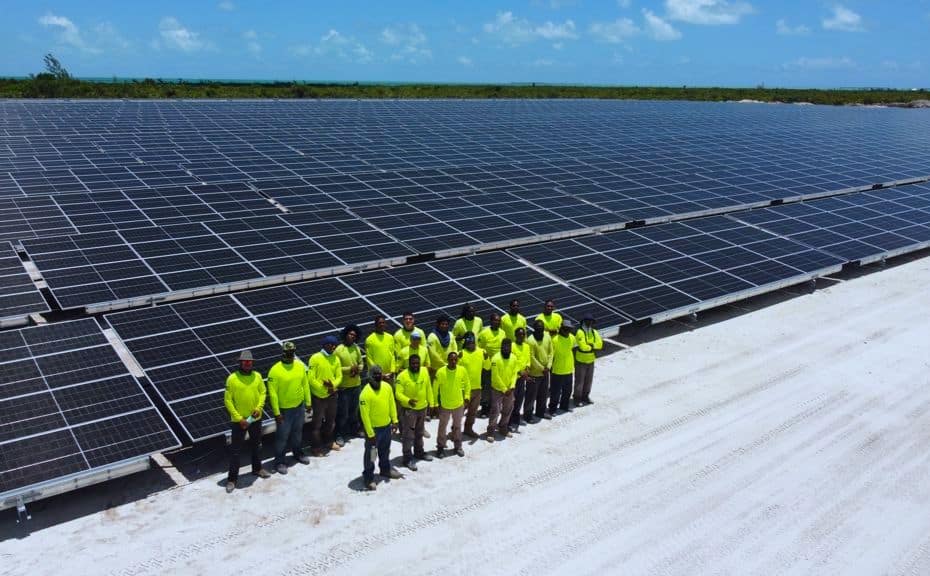Chub Cay Resort and Marina now harness energy at the country’s largest solar array. Layered on the edge of Chub Cay, Berry Islands, the 10-acre, 4MW ground-mounted solar field comprises 7,600 solar panels and a microgrid control system that could easily be the envy of the Caribbean.
Compass Solar has positioned Chub Cay to become energy independent by reducing the resort’s diesel fuel consumption and resulting emissions by 95%.
The resort’s General Manager David Renaud said, “Energy production is our second-highest monthly expense with diesel fuel only being one component of the cost. Our (Chub Cay) transition to renewable energy is designed to elevate the guest experience and benefit our bottom line. Chub Cay is happy to be an industry leader and hopes that other resorts will follow the same path.”
Compass Power is a turnkey EPC solutions provider for energy systems in the Caribbean. Its renewable subsidiary, Compass Solar specializes in commercial/utility solar and microgrid projects having completed +5MW of solar installations with a further 5MW under contract as the leading Bahamian choice for renewable EPC Projects.
According to Compass Power Principal, Justin Cunningham, this project makes Compass Power the only resident Bahamian contractor to achieve such an installation—the second-largest power installation the company has completed in its 16-year history.

“For Compass Solar to be the EPC (engineer, procure and construct) contractor for the largest microgrid in the country is a game-changing opportunity,” said Cunningham. “Coupled with the engineering skills required to build out large power stations, such as the Baha Mar Resort, this makes Compass the only resident Bahamian contractor to install over 70MW of traditional and renewable power applications.”
The solar field has garnered praise from the world’s industry leaders and was most recently named the 2021 Solar + Storage Project of the Year by Solar Builder Magazine.
Carefully leveled, graded, and compacted, the PV array is 10 acres, with 472 individual ground-mounted structures engineered to withstand 185 mph sustained hurricane winds with gusts over 210 mph.
Specialized equipment was used to drill over 2000 ground screws into exact locations and to specific torque limits. The solar panels are 540-watt bi-facial, which are best for energy production, capturing both direct sunlight and ground reflection.
Supporting the Chub Cay resort’s loads is another first for the Bahamas. Compass paired four 1MW bi-directional PCS inverters with a 10MWh lithium-ion battery energy storage system (BESS) in two custom and environmentally sealed and hurricane-rated enclosures.
Each building is comprised of 40 battery racks loaded with 17 modules, weighing over 200 pounds each. Additionally, to achieve completed redundancy for the resort the BESS, PCS inverters, and PV field is divided into two halves, each separately connected and with the ability to operate independently of one another.
All of the primary building material components were sourced from a global tier 1 manufacturer and vetted by third-party industry auditors.
According to Cunningham, the “backbone of the system is a sophisticated microgrid control SCADA system,” which was supplied by an industry leader, Hitachi ABB Power Grids, which is headquartered in Switzerland. This automated controller autonomously manages the grid power flow providing both charge and discharge capability to support the battery energy storage systems and the Chub Cay Resort and Marina properties.
The medium voltage solar and battery energy interconnection form an island micro-grid. It’s a detailed retrofit of the existing paralleling and distribution gear, overlaying the microgrid control architecture to blend solar, battery, and diesel resources, as well as monitoring island loads.
Compass Power hopes that this is the beginning of many firsts for the country, as The Bahamas aims to close the gap toward clean, renewable energy, preserving the future of our planet.

